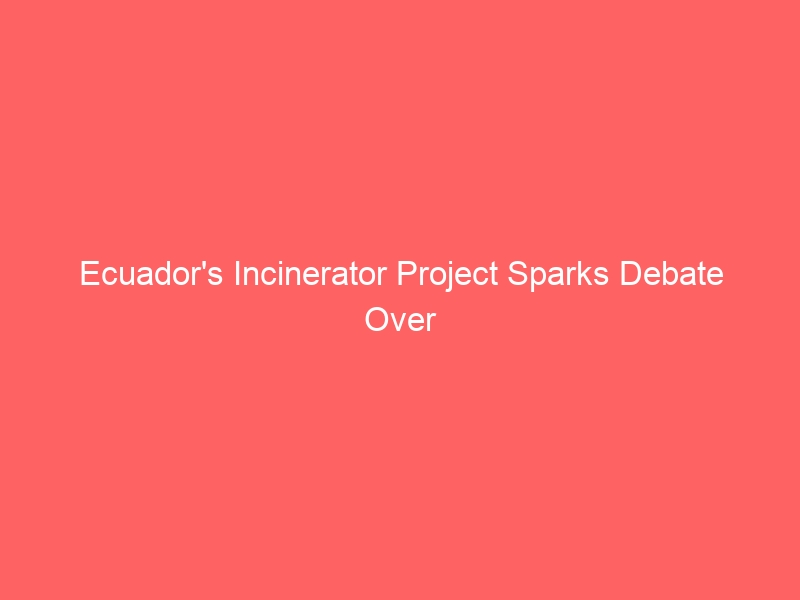Ecuador’s Incinerator Project Sparks Debate Over Sustainable Waste Management
The South American country of Ecuador has been making strides in their efforts towards sustainable waste management. With a growing population and urbanization, the country has been facing challenges in effectively managing and disposing of its waste. In a bid to combat this issue, the Ecuadorian government has proposed the construction of an incinerator as part of their waste management strategy. However, this project has sparked a heated debate over the environmental and social implications of such a move.
The Incinerator Project
The proposed incinerator project aims to reduce the volume of waste by burning it at high temperatures, resulting in the production of electricity and heat. This method of waste disposal is seen as a way to alleviate the strain on landfills and reduce the environmental impact of waste accumulation. The government argues that the incinerator will help the country shift towards a more sustainable and clean energy source, while also providing an alternative to the current reliance on landfills for waste disposal.
The Debate
While the government sees the incinerator as a viable solution to the country’s waste management issues, many environmentalists and local communities are raising concerns about the potential negative impact of the project. One of the main concerns is the release of harmful pollutants and toxins into the air and soil as a result of the incineration process. This has led to fears about the potential health risks for those living near the proposed incinerator site.
Additionally, there are concerns about the long-term implications of investing in incineration technology, which some argue perpetuates a linear economy model rather than promoting circular and sustainable waste management practices. Critics argue that the focus should be on reducing, reusing, and recycling waste, rather than relying on incineration as the primary method of waste disposal.
Furthermore, the incinerator project has also sparked social concerns, with many arguing that it will disproportionately impact marginalized communities and indigenous groups. There are fears that the incinerator will be located in areas with high poverty rates, further exacerbating environmental injustice and social inequality.
The opposition to the incinerator project has ignited protests and demonstrations, with local communities and environmental activists demanding a more sustainable and inclusive approach to waste management. Some have called for a comprehensive waste management plan that focuses on reducing waste production, promoting recycling and composting, and investing in cleaner and more sustainable technologies.
FAQs
Q: What are the environmental concerns about the proposed incinerator project in Ecuador?
A: The main environmental concerns surrounding the incinerator project in Ecuador revolve around the release of harmful pollutants and toxins into the air and soil. There are fears about the potential impact on human health and the environment, as well as concerns about the long-term implications of investing in incineration technology.
Q: What are the social implications of the incinerator project?
A: Many argue that the incinerator project will disproportionately impact marginalized communities and indigenous groups, further perpetuating environmental injustice and social inequality. There are fears that the incinerator will be located in areas with high poverty rates, exacerbating existing social disparities.
Q: What are the alternatives to incineration for waste management?
A: Alternatives to incineration for waste management include reducing waste production, promoting recycling and composting, and investing in cleaner and more sustainable technologies. A comprehensive waste management plan should focus on a circular economy model that prioritizes reducing, reusing, and recycling waste.
Q: What is the government’s rationale for the incinerator project?
A: The government argues that the incinerator project will help shift towards a more sustainable and clean energy source, while also providing an alternative to the current reliance on landfills for waste disposal. They see incineration as a viable solution to the country’s waste management issues.
In conclusion, the incinerator project in Ecuador has sparked a heated debate over the country’s approach to sustainable waste management. While the government sees incineration as a solution to the growing waste management challenges, environmentalists and local communities are raising concerns about the potential negative impact on the environment and society. As the debate continues, it is crucial for the government to consider the long-term implications of the incinerator project and explore more sustainable and inclusive approaches to waste management.
Ecuador’s Incinerator Project Sparks Debate Over Sustainable Waste Management




